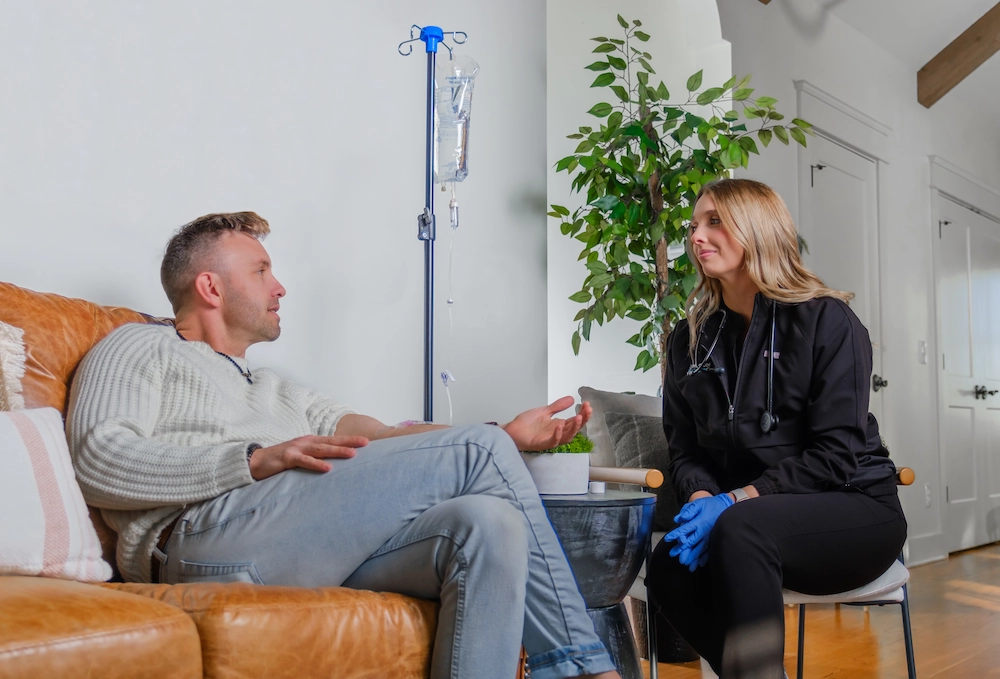
Recharge with At-Home IV Therapy
Table of Contents
Rejuvenating Recovery: Discover the Benefits of Hangover IV Therapy
We’ve all been there – waking up after a night of celebration with a pounding headache, nausea, and an overwhelming sense of fatigue. Hangovers are an unpleasant aftermath of indulging in alcohol. In recent years, intravenous (IV) therapy, also known as IV treatment, under the advice of a licensed physician, has emerged as a popular solution, promising a faster and more efficient recovery.
This article will delve into IV therapy for hangovers, exploring its benefits, the science behind it, and whether it lives up to the hype.
Understanding Hangovers
Alcohol consumption leads to dehydration as it increases urine production, leading to the loss of essential electrolytes like potassium and sodium. Furthermore, alcohol causes inflammation and contributes to the production of toxins that can leave individuals feeling lethargic and unwell.
That is where IVs, prescribed by a professional physician, step in.
Introduction to IV Therapy
IV therapy, also known as IV treatment, involves administering a customized blend of fluids, vitamins, minerals, NAD+, and/or more into the bloodstream using IVs. This health-improving system should be devised under the advice of a physician.
Benefits and Risks of IV Therapy
One significant advantage of this treatment is the efficient delivery of IV fluids, electrolytes, medications, and nutrients. The medication infused into the system via this method ensures a quicker onset of action than oral administration, making it useful in emergencies or when oral intake is impossible. IV administration allows for precise control over dosage, making it a preferred choice for medications with dispensing requirements.
However, like all treatments, people must be conscious of the potential difficulties. These can include infection at the insertion site, bruising, and irritation of the veins. There is also a risk of air embolism if air enters the bloodstream. In some cases, patients may experience allergic reactions or nausea to the substances. Healthcare professionals need to monitor patients to mitigate these risks. Also, unnecessary or improper use of IV therapy can lead to electrolyte imbalances, vein damage, or other complications.
The Components of Hangover IV Therapy:
Hydration
The primary component in IV fluids is saline solution, which rehydrates the body, offering relief from the dehydration caused by alcohol consumption.
Electrolytes
IV therapy often includes electrolytes such as potassium and sodium, which restore the balance disrupted by alcohol’s diuretic effects.
Vitamins and Antioxidants
To combat inflammation and aid recovery, hangover IV therapy includes vitamins such as B-complex (B1, B2, B3, B5, and B6), vitamin C, and antioxidants like glutathione. Under a physician’s advice, this advanced system offers quick relief from hangover symptoms.
Scientific Basis
The science behind this treatment is grounded in the efficient absorption of nutrients. Unlike oral intake, which involves digestion and potential nutrient degradation, intravenous administration ensures rapid and complete absorption, facilitating a faster recovery.

Tips for Maximizing Hangover Recovery with IV Therapy
While IV therapy can be a powerful tool for hangover recovery, it’s not a substitute for responsible drinking. Moderation and knowing your limits remain crucial aspects of preventing hangovers in the first place. Always consult your physician before starting any new treatment.
- Act Promptly: Don’t wait until the hangover symptoms are at their peak; consider getting IV treatment as soon as you start feeling the effects of excessive alcohol consumption.
- Choose the Appropriate Formula: Opt for a customized blend that addresses your symptoms. A combination of hydration, electrolytes, B vitamins, and antioxidants can replenish what your body lost during alcohol consumption and promote a faster recovery.
- Stay Hydrated Before and After: Drinking water before alcohol consumption and continuing to hydrate afterward will enhance the effectiveness of IV therapy and contribute to quicker recovery.
- Sessions for Chronic Hangovers: If you often grapple with hangovers, consider incorporating IV therapy sessions into your wellness routine. Some individuals opt for periodic treatments as a proactive measure, especially after occasions involving alcohol.
- Combine with Wholesome Habits: Ensure you sleep well, maintain a balanced diet, and engage in physical activity. These habits contribute to well-being and reduce the severity and frequency of hangovers.
How to Choose a Reputable IV Therapy Provider
Verify the Credentials of the Clinic or Practitioner
Ensure they are licensed healthcare professionals or operate under the supervision of qualified medical personnel. Look for practitioners who adhere to hygiene and safety standards, including sterile equipment and proper infection control measures.
Inquire About the Customization of IV Formulations
A reputable IV treatment provider will offer personalized blends tailored to people’s needs, whether recovering from a hangover, boosting energy, or addressing health concerns. Transparency in disclosing the ingredients and their concentrations indicates a trustworthy provider. Medical House Calls offers an extensive IV Therapy Menu where patients can see the ingredients for each on their website.
Read Reviews and Seek Recommendations for Insights
A provider with positive testimonials and a history of satisfied clients will likely offer reliable and quality service. Research online yourself or ask around for advice from friends and family. Medical House Calls boasts nearly 500 Google reviews from past patients, all of which have five-star ratings.
Consider the Atmosphere of the Facility
A clean and welcoming environment enhances the experience and reflects a commitment to professionalism and client care. Many providers also offer IV therapy as a mobile service, meaning they can visit you at home or work for the treatment. In that case, ensure the provider’s website is up-to-date and welcoming.
What to Expect During an IV Therapy Session
Upon arrival, an assessment will be performed to discuss your needs and medical history. Once the customized IV formulation is determined, a practitioner will locate a suitable vein, often in the arm, and insert a sterile needle connected to an IV line. The insertion is instant and painless.
Throughout the session, you can recline in a chair while the IV drip administers the fluids, vitamins, and minerals into your bloodstream. The duration of the session ranges from 30 minutes to an hour.
Afterward, the healthcare professional will remove the needle, and you can resume activities. The experience is designed to be convenient and rejuvenating, offering a prompt way to address wellness needs.
Does IV Therapy Work for Hangovers?
Intravenous therapy for hangovers has gained popularity as a cure for post-celebration discomfort. While the science behind its effectiveness is promising, more research is needed to establish its efficacy.
As with all health-related decisions, individuals should consult with healthcare professionals before embracing IV therapy for hangovers and consider it as part of a broader strategy for responsible drinking and well-being.
Medical House Calls Offers Mobile IV Therapy Services
Medical House Calls offers Mobile IV Therapy services with an extensive menu that includes vitamins, electrolytes, antioxidants, and NAD+. We provide all the necessary supplies, whether you require IV therapy at home or in the work office. To book a same-day or next-day appointment, text or call us today!
Unlock Vitality with NAD+ Therapy











